- Home
- Cory Doctorow
Someone Comes to Town, Someone Leaves Town
Someone Comes to Town, Someone Leaves Town Read online
Copyright (C) 2005 by Cory Doctorow. Some Rights Reserved.
?Someone Comes to Town, Someone Leaves Town
Cory Doctorow
[email protected]
Published by Tor Books
July 2005
ISBN: 0765312786
https://craphound.com/someone
Some Rights Reserved
--
=============== About this book ===============
This is my third novel, and as with my first, Down and Out in the MagicKingdom (https://craphound.com/down) and my second, Eastern StandardTribe (https://craphound.com/est), I am releasing it for free on theInternet the very same day that it ships to the stores. The books aregoverned by Creative Commons licenses that permit their unlimitednoncommercial redistribution, which means that you're welcome to sharethem with anyone you think will want to see them. In the words of WoodyGuthrie:
"This song is Copyrighted in U.S., under Seal of Copyright #154085, fora period of 28 years, and anybody caught singin it without ourpermission, will be mighty good friends of ourn, cause we don't give adern. Publish it. Write it. Sing it. Swing to it. Yodel it. We wrote it,that's all we wanted to do."
Why do I do this? There are three reasons:
* Short Term
In the short term, I'm generating more sales of my printed books. Sure,giving away ebooks displaces the occasional sale, when a downloaderreads the book and decides not to buy it. But it's far more common for areader to download the book, read some or all of it, and decide to buythe print edition. Like I said in my essay, Ebooks Neither E Nor Books,(https://craphound.com/ebooksneitherenorbooks.txt), digital and printeditions are intensely complimentary, so acquiring one increases yourneed for the other. I've given away more than half a million digitalcopies of my award-winning first novel, Down and Out in the MagicKingdom, and that sucker has blown through *five* print editions(yee-HAW!), so I'm not worried that giving away books is hurting mysales.
* Long Term
Some day, though, paper books will all but go away. We're alreadyreading more words off of more screens every day and fewer words off offewer pages every day. You don't need to be a science fiction writer tosee the writing on the wall (or screen, as the case may be).
Now, if you've got a poor imagination, you might think that we'll enterthat era with special purpose "ebook readers" that simulate theexperience of carrying around "real" books, only digital. That's likebelieving that your mobile phone will be the same thing as the phoneattached to your wall, except in your pocket. If you believe this sortof thing, you have no business writing sf, and you probably shouldn't bereading it either.
No, the business and social practice of ebooks will be way, way weirderthan that. In fact, I believe that it's probably too weird for us toeven imagine today, as the idea of today's radio marketplace wasincomprehensible to the Vaudeville artists who accused the radio stationowners of mass piracy for playing music on the air. Those people justcould *not* imagine a future in which audiences and playlists werestatistically sampled by a special "collection society" created by aCongressional anti-trust "consent decree," said society to hand outmoney collected from radio stations (who collected from soapmanufacturers and other advertisers), to compensate artists. It wasinconceivably weird, and yet it made the artists who embraced it rich ashell. The artists who demanded that radio just *stop* went broke, endedup driving taxis, and were forgotten by history.
I know which example I intend to follow. Giving away books costs me*nothing*, and actually makes me money. But most importantly, itdelivers the very best market-intelligence that I can get.
When you download my book, please: do weird and cool stuff withit. Imagine new things that books are for, and do them. Use it inunlikely and surprising ways. Then *tell me about it*. Email me([email protected]) with that precious market-intelligence aboutwhat electronic text is for, so that I can be the first writer to figureout what the next writerly business model is. I'm an entrepreneur and Ilive and die by market intel.
Some other writers have decided that their readers are thieves andpirates, and they devote countless hours to systematically alienatingtheir customers. These writers will go broke. Not me -- I love youpeople. Copy the hell out of this thing.
* Medium Term
There may well be a time between the sunset of printed text and theappearance of robust models for unfettered distribution of electronictext, an interregnum during which the fortunes of novelists follow thoseof poets and playwrights and other ink-stained scribblers whoseindustries have cratered beneath them.
When that happens, writerly income will come from incidental sourcessuch as paid speaking engagements and commissioned articles. No, it'snot "fair" that novelists who are good speakers will have a better dealthan novelists who aren't, but neither was it fair that the era of radiogave a boost to the career of artists who played well in the studios,nor that the age of downloading is giving a boost to the careers ofartists who play well live. Technology giveth and technology takethaway. I'm an sf writer: it's my job to love the future.
My chances of landing speaking gigs, columns, paid assignments, and therest of it are all contingent on my public profile. The more peoplethere are that have read and enjoyed my work, the more of these gigsI'll get. And giving away books increases your notoriety a whole lotmore than clutching them to your breast and damning the pirates.
So there you have it: I'm giving these books away to sell more books, tofind out more about the market and to increase my profile so that I canland speaking and columnist gigs. Not because I'm somepatchouli-scented, fuzzy-headed, "information wants to be free"info-hippie. I'm at it because I want to fill my bathtub with money andrub my hands and laugh and laugh and laugh.
#
Developing nations
A large chunk of "ebook piracy" (downloading unauthorized ebooks fromthe net) is undertaken by people in the developing world, where theper-capita GDP can be less than a dollar a day. These people don'trepresent any kind of commercial market for my books. No one in Burundiis going to pay a month's wages for a copy of this book. A Ukrainianfilm of this book isn't going to compete with box-office receipts in theUkraine for a Hollywood version, if one emerges. No one importscommercial editions of my books into most developing nations, and ifthey did. they'd be priced out of the local market.
So I've applied a new, and very cool kind of Creative Commons license tothis book: the Creative Commons Developing Nations License(https://creativecommons.org/licenses/devnations/2.0/). What that meansis that if you live in a country that's not on the World Bank's list ofHigh-Income Countries(https://rru.worldbank.org/DoingBusiness/ExploreEconomies/EconomyCharacteristics.aspx), you get to do practically anything you want with this book.
While residents of the rich world are limited to making noncommercialcopies of this book, residents of the developing world can do muchmore. Want to make a commercial edition of this book? Be my guest. Afilm? Sure thing. A translation into the local language? But of course.
The sole restriction is that you *may not export your work with my bookbeyond the developing world*. Your Ukrainian film, Guyanese printedition, or Ghanian translation can be freely exported within thedeveloping world, but can't be sent back to the rich world, where mypaying customers are.
It's an honor to have the opportunity to help people who are livingunder circumstances that make mine seem like the lap of luxury. I'mespecially hopeful that this will, in some small way, help developingnations bootstrap themselves into a better economic situation.
#
DRM
The worst technology idea since the electrified nipple-clamp is "DigitalRights Management,"
a suite of voodoo products that are supposed tocontrol what you do with information after you lawfully acquire it. Whenyou buy a DVD abroad and can't watch it at home because it's from thewrong "region," that's DRM. When you buy a CD and it won't rip on yourcomputer, that's DRM. When you buy an iTune and you can't loan it to afriend, that's DRM.
DRM doesn't work. Every file ever released with DRM locks on it iscurrently available for free download on the Internet. You don't needany special skills to break DRM these days: you just have to know how tosearch Google for the name of the work you're seeking.
No customer wants DRM. No one woke up this morning and said, "Damn, Iwish there was a way to do less with my books, movies and music."
DRM can't control copying, but it can control competition. Apple canthreaten to sue Real for making Realmedia players for the iPod on

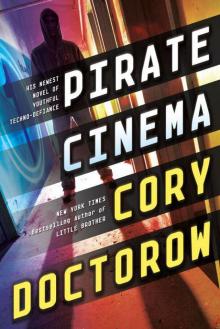 Pirate Cinema
Pirate Cinema Walkaway
Walkaway Little Brother
Little Brother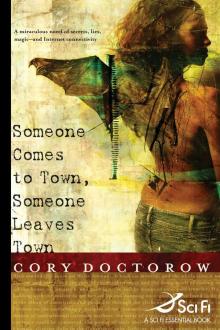 Someone Comes to Town, Someone Leaves Town
Someone Comes to Town, Someone Leaves Town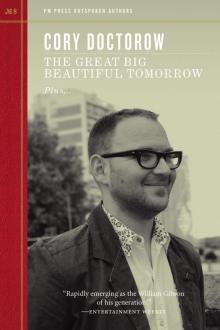 The Great Big Beautiful Tomorrow
The Great Big Beautiful Tomorrow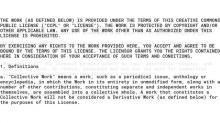 Super Man and the Bug Out
Super Man and the Bug Out For the Win
For the Win A Place so Foreign
A Place so Foreign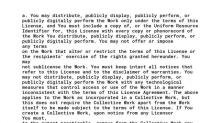 Shadow of the Mothaship
Shadow of the Mothaship Return to Pleasure Island
Return to Pleasure Island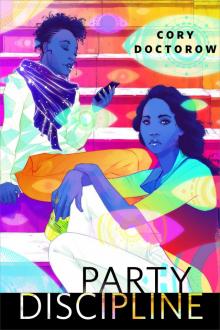 Party Discipline
Party Discipline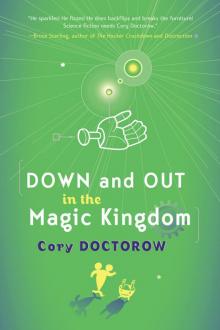 Down and Out in the Magic Kingdom
Down and Out in the Magic Kingdom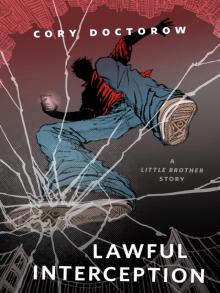 Lawful Interception
Lawful Interception Homeland
Homeland Eastern Standard Tribe
Eastern Standard Tribe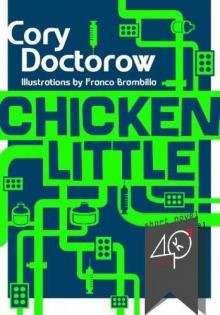 Chicken Little
Chicken Little I, Row-Boat
I, Row-Boat Makers
Makers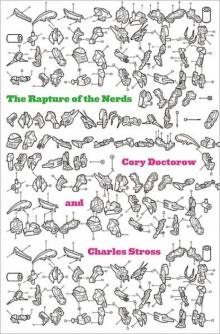 Rapture of the Nerds
Rapture of the Nerds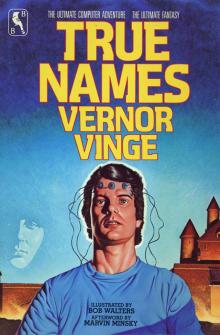 True Names
True Names